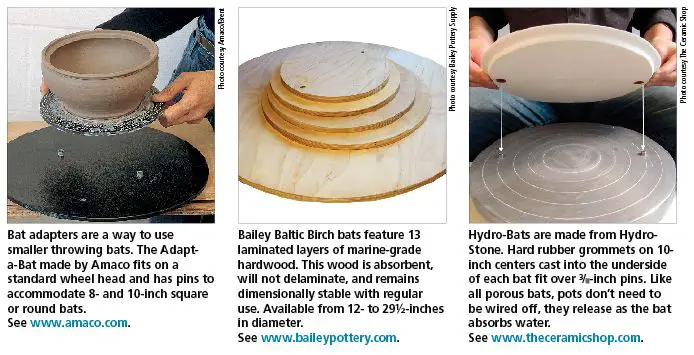How Do I Start A Career In Ceramics?
Ceramics is an ancient and beloved art form that has evolved into a viable career path for many. There are several potential jobs and industries within the field of ceramics, making it a diverse and dynamic profession. Ceramic artists may work as studio potters, designers, educators, or in architectural and industrial settings. Some common career opportunities include:
– Studio potter – Create functional, decorative, or sculptural work to sell independently.
– Production potter – Produce utilitarian pottery and ceramic items for wholesale or retail sale.
– Ceramic designer – Design ceramic products for companies and manufacturers.
– Ceramic arts instructor – Teach pottery and other ceramic techniques in schools, colleges, studios, and community centers.
– Architectural ceramicist – Create custom ceramic tiles, murals and other architectural elements.
– Industrial ceramicist – Develop ceramic products and solutions for industrial applications.
The ceramics field allows for creativity and self-expression through a tactile, hands-on medium. With dedication and business acumen, ceramic artists can build sustainable careers around their passion for clay.
Required Education
While formal education is not always required to become a ceramic artist, taking classes and earning a degree can provide important skills and knowledge. Many aspiring ceramicists earn a Bachelor of Fine Arts (BFA) degree with a focus on ceramics or sculpture from an art school or university art program. These 4-year degree programs teach foundational skills like wheel throwing, hand building, mold making, glaze chemistry, and kiln firing. Students also take art history, 2D and 3D design, and liberal arts courses as part of a well-rounded art curriculum.
Other options include earning an Associate of Arts (AA) degree from a community college art program, which takes 2 years and focuses on building fundamental artistic abilities. Some art schools also offer intensive 1-2 year certificate programs specifically in ceramics. While formal education is not required to work in ceramics, these programs can provide critical hands-on experience, access to studio space and equipment, and preparation for a professional art career. Many aspiring ceramic artists also take community college classes, specialized workshops, residencies, or apprenticeships to continue honing their skills outside of degree programs.
According to https://www.zippia.com/ceramics-teacher-jobs/education/, 67% of ceramics teachers hold a bachelor’s degree, showing formal education is valued in ceramic art professions.
Developing Your Skills
One of the most important ways to develop your ceramic skills is through hands-on practice working with clay, glazes, and firing techniques. Taking classes at a local studio or community college can provide structured learning and access to equipment and materials. As you gain experience, focus on improving core skills like throwing, handbuilding, sculpting, decorating, and glazing. According to the Crafts Council, “Key skills for a ceramicist include: creative flair and practical ceramics skills; time management and the ability to work to deadlines…”
It’s also helpful to build a portfolio of your work over time. Document your progress by photographing finished pieces. A portfolio shows your style and capabilities. Blogger Jake Wilder also recommends practicing consistently: “In the ceramics class example, it’s relatively straightforward. Practice making clay pots and you get better at making clay pots.”
Sources:
https://www.craftscouncil.org.uk/learning/craft-careers/how-become-ceramicist
https://jswilder16.medium.com/how-to-improve-every-day-af6711d387fc
Getting Experience
Getting hands-on experience is vital for building your skills and portfolio in ceramics. Here are some good options to gain experience as you start your career:
Volunteer at local art centers, galleries, or studios to learn techniques and get exposure to the field. Many places need extra help with classes, events, and day-to-day operations. Check listings on sites like VolunteerMatch.
Look for internships at ceramic studios, art centers, or related businesses to gain work experience. Paid internships are ideal, but unpaid ones can be worthwhile for the knowledge you gain. Search sites like Indeed and check directly with local organizations.
Enroll in a work-study program through your college art department if available. Work-study jobs on campus allow you to earn income and experience related to your major simultaneously.
Apply for competitive residencies at art centers, universities, or studios across the country. Completing a residency enables concentrated time to develop your abilities through access to equipment, materials, and mentorship from experienced ceramic artists.
Building a Brand
Building a strong personal brand as a ceramic artist is key to getting your work seen and establishing a reputation. Some important ways to build your brand include:
Create a website to showcase your work and share your story. A website helps collectors find you and gives you credibility as a professional artist. Make sure your website conveys your artistic vision and brand identity (Telling Your Story Through Branding).

Use social media to connect with potential collectors and build an audience. Platforms like Instagram and Facebook allow you to share works in progress, finished pieces, inspiration, and news about shows. Engaging with followers helps spread the word about your work.
Sell your finished pieces through galleries, art fairs, and online marketplaces. Getting your work out into the world is important for establishing demand and earning income. Approach galleries that feature work similar to yours or apply to selective art fairs.
Enter competitive shows and exhibitions to gain exposure and credentials. Getting accepted into prestigious shows can boost your reputation. It also gives you the chance to network with other artists, gallery owners, and collectors.
In general, look for opportunities to get your name and work in front of potential collectors. Branding is about finding ways for your target audience to discover you (Should a Potter Create a Brand?). Consistently producing excellent work and putting it out into the world will help build recognition.
Finding Jobs
There are many ways to find job opportunities in the ceramics field. Some key places to search and network include:
Research ceramics studios, manufacturers, retailers, and galleries that produce original works or functional pottery to see if they are hiring. Many have job listings on their websites or social media pages. You may also be able to apprentice or intern at an established studio to gain experience and make connections.
Search job boards like Indeed, LinkedIn, and SimplyHired for listings specifically focused on the ceramics industry.
Attend craft fairs, art walks, gallery events, and ceramics conventions to network in person and learn about potential jobs and apprenticeships. Introduce yourself, share your work, and get your name out there.
Check listings through local arts councils, craft guilds, artist residency programs, and community art centers, which often have job boards. Ceramics teaching positions are commonly listed here.
Search higher education job sites and ceramic programs at colleges and universities that may need instructors, technicians, and studio assistants.
Consider freelance and commission-based work, building relationships with interior designers, architects, home decor outlets, and other potential clients.
Self-Employment
One path for starting a career in ceramics is by working for yourself as a self-employed ceramic artist. This allows the flexibility to set your own hours and focus on your creative passions. According to vice.com, many ceramic artists split their time between managing their own studio space and working as freelancers.
Some ways to be self-employed in ceramics include:
- Open your own studio – Having a dedicated space to create and sell your ceramic artwork. You can open a private studio or join a shared studio community.
- Sell work online – Build an online store to sell your finished ceramic pieces, prints, or merchandise.
- Take commissions – Offer custom ceramic work based on clients’ requests and specifications.
- Teach classes – Share your skills through private or group lessons, workshops, and classes.
Starting your own pottery business takes dedication but can be very rewarding creatively and financially. Be sure to create a thorough business plan covering costs, marketing, and projections to launch and grow your ceramics brand.
Portfolio and Marketing
Having a strong portfolio of work samples is crucial for landing jobs and commissions in ceramics. Your portfolio should showcase 8-12 of your best pieces across a range of styles, forms, and techniques. Professional photos of finished works are ideal, but high-quality images of works-in-progress can also demonstrate your skills and process. When applicable, include details like dimensions, materials, and firing methods. As noted in the article 10 Incredible Ceramics and Pottery Portfolios for Inspiration, portfolios should highlight uniqueness and creativity.
In addition to physical portfolios, an online presence is important for promoting your work. A website or social media profiles like Instagram allow you to easily share images of new creations with potential clients and employers. Use high-quality photos and videos that capture the textures and details of each piece. According to the sample portfolio at Ceramic Design Portfolio 2022, concise artist statements can provide helpful context for each project. Update your online portfolio frequently to keep your work fresh.
Develop marketing materials like business cards, postcards, and brochures to promote your services. Quality images of your work, contact information, and a branding statement or tagline will make memorable impressions at networking events, galleries, craft fairs, and client meetings. As shown on the portfolio website at P O R T F O L I O – Ceramic Artist, consistency across your marketing materials strengthens your brand identity.
Networking
Networking with other professionals in the ceramics field can help expand your career opportunities. Here are some tips for connecting with other artists, manufacturers, galleries, and more in the ceramics community:
Attend industry events like the NCECA annual conference to meet and mingle with other ceramic artists. Conferences offer chances to see exhibitions, take workshops, and make connections.
Follow ceramics professionals, brands, galleries, etc. on social media. Engage with their content and join online ceramics groups to connect with fellow artists.
Volunteer or take workshops at local ceramic studios to get to know others in your area’s ceramic arts scene.
Introduce yourself to gallery owners at art walks and events. Ask about opportunities to show or sell your work.
Consider joining professional associations like the National Council on Education for the Ceramic Arts (NCECA) or the American Ceramic Society (ACerS) to access resources and networking opportunities.
Keys to Success
To build a successful career in ceramics, there are several key factors that are important to keep in mind:
Patience and persistence are crucial. Becoming skilled at pottery and establishing yourself takes time and dedication. As noted in the article “10 Tips On How To Become A Successful And Confident Potter” on PotteryCrafters.com, “Practice patience. Making ceramics is a lifelong learning process. Don’t expect to be perfect right away. Allow yourself time to learn and grow.”
Strong business and marketing skills are also vital to turning pottery into a career. You need knowledge of pricing, selling, social media marketing, branding, etc. to promote your work effectively. As the article “A Pottery Paycheck: Expert Insights into Making a Living as a Potter” on CeramicArtsNetwork.org explains, “It takes more than great pottery skills to make a living as a potter. You also need business savvy.”
Creativity and passion for the craft will keep you engaged and designing innovative new pieces. The work requires dedication, so loving what you do is key. As the CeramicArtsNetwork article notes, “Making a living as a potter requires tenacity and creativity.”
With patience, persistence, business know-how, creativity, and passion for ceramics, you can develop a rewarding career working with clay.




